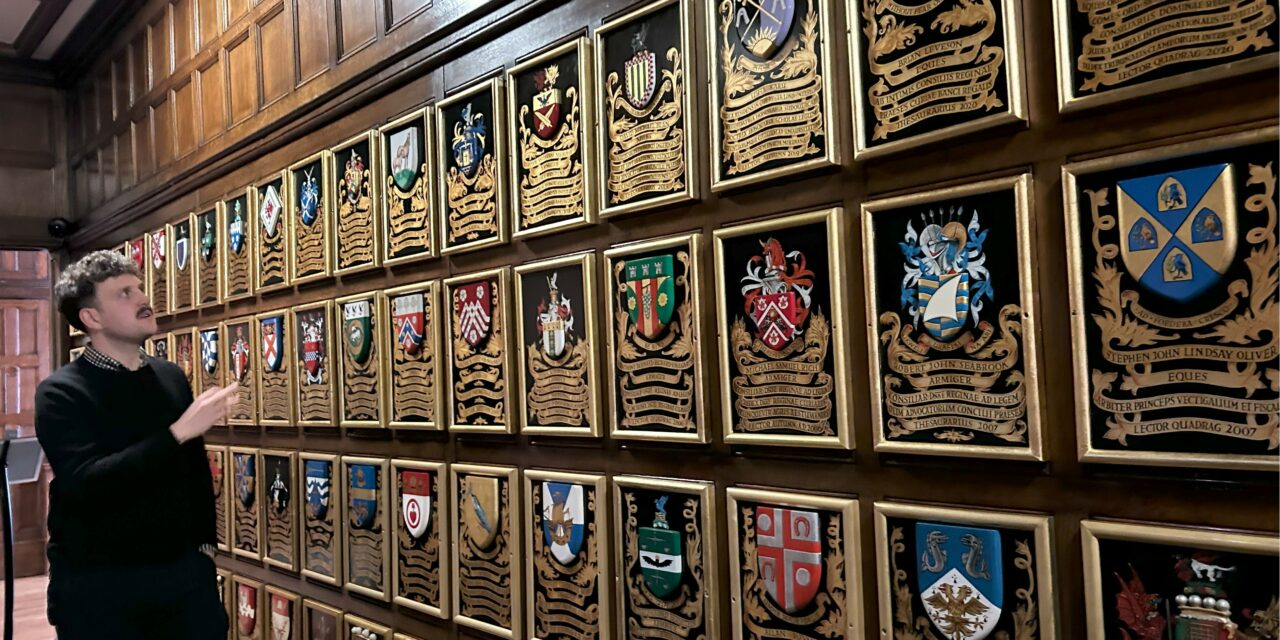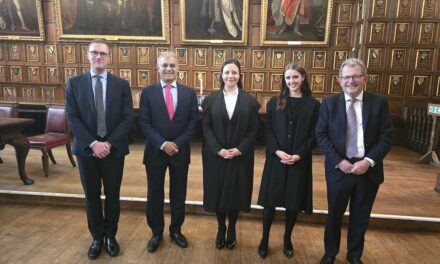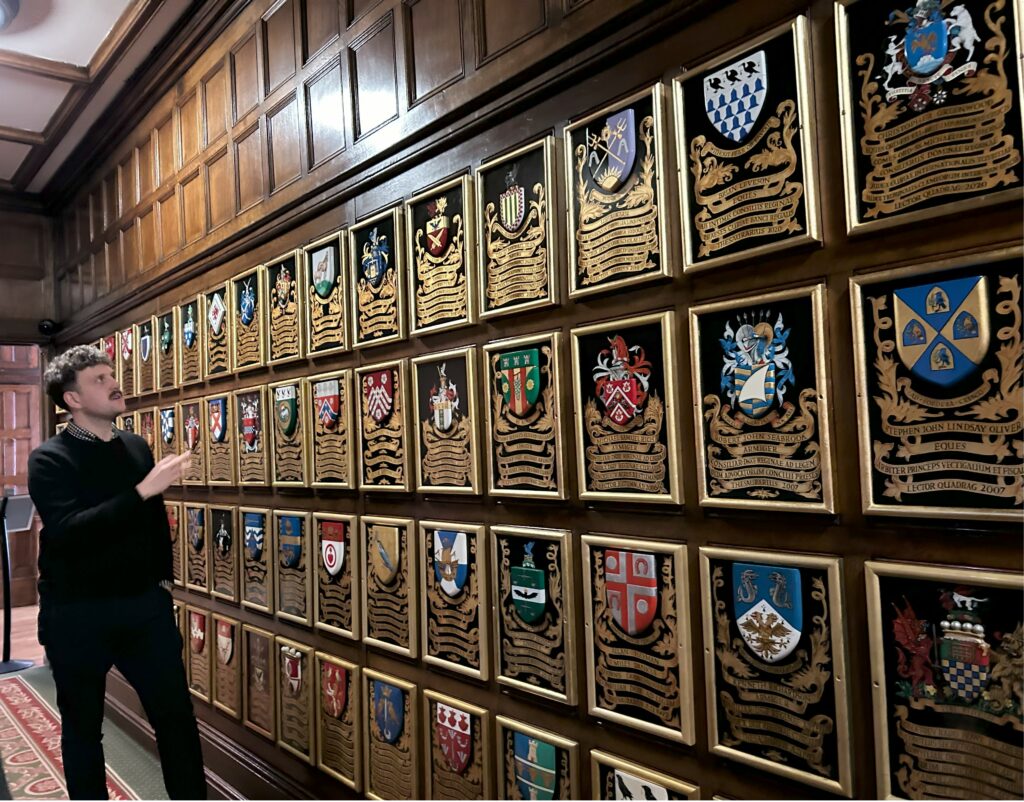
When Judge Greiner reached out to Creighton Law School’s international department, many of us were excited at the prospect of learning about something no one else knew. The few of us selected could not have supposed the eminence of the experience; or that our hosts were more than just English lawyers, they would become friends and mentors. With gratitude we collectively share some of our heartfelt appreciation and perspectives. Thank you to Middle Temple and all the Creighton administrators that supported this barrister advocacy training weekend – it was phenomenal!
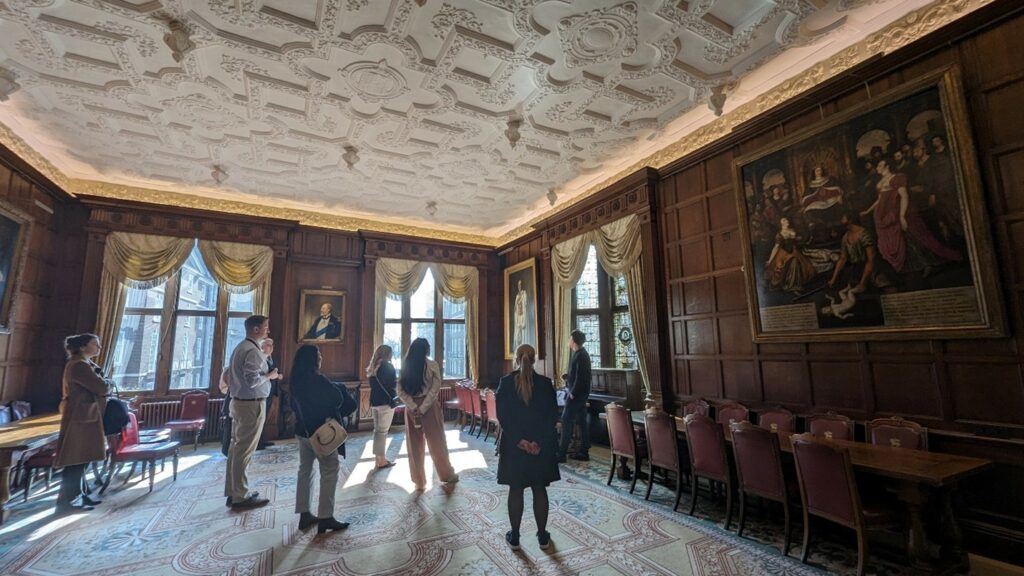
We cannot express how wonderfully fascinating the entire experience was for us. What we were taught, practiced, and critiqued upon really exceeded our expectations. The British Common Law may have been foundational to the American system, but for most of us, it is unique, curious, and unknown. The ability to interact with up-and-coming barrister students, practicing barristers with decades of experience, and sitting judges in the English court (all members of Middle Temple) was a once in a lifetime pleasure. We will cherish the associations, memory, and friendships made. This exchange was also noteworthy in that our benefactor, ‘Prosecutor Greiner’ stole the show in his demonstration of closing arguments in the American courts system. It seemed that at every meal or free time from then on, people commented on the desire to hear and see more of his delivery, techniques, tips, and tricks shared in that training session.
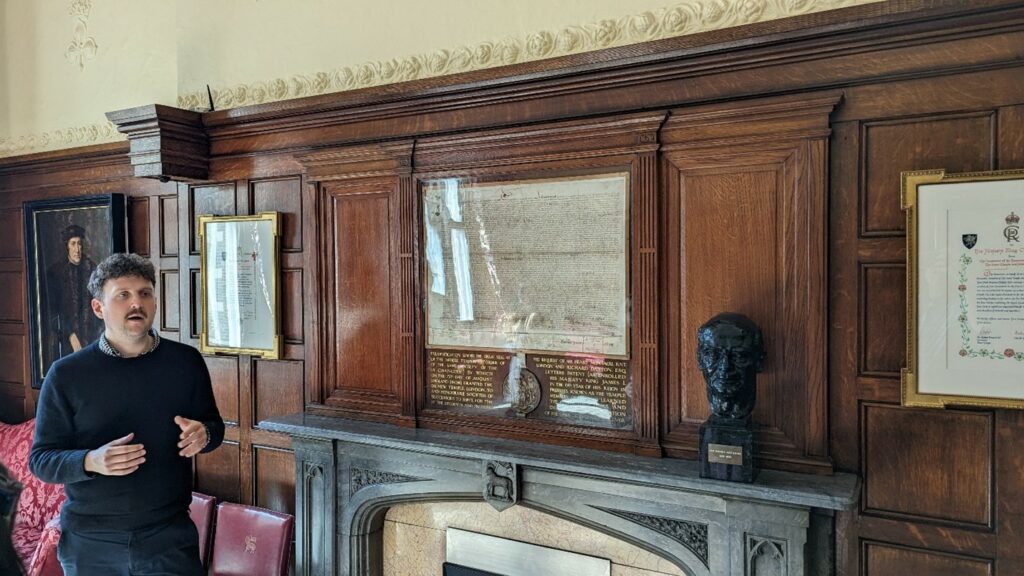
The British system is the foundation to ours, but it is uniquely different too. Learning more about it is sure to be helpful as we continue our legal education and career journey. It is true that cross-pollination is always a blessing to outcomes, and stove piping can unnecessarily stifle innovation and improvement. Of course, it is easy to say that understanding history and foundation allows one to more fully understand and appreciate how things are today. But actually learning, arguing, and advocating under the British system likely helps to refine the ‘how’ we do things in our futures.
I found British people to be polite and deferential; the barristers that trained us were so professional, it was a pleasure to attempt to say things in the kindest way possible without losing any of the force of thought or purpose. For example, it was fascinating to hear in one of our small groups the instructor rephrase a classmate’s attempt at a plea for mitigation of sentence in such an instructionally adroit and masterful way. Language can be very powerful when presented properly.
Being one of the first Americans to attend Cumberland Lodge Advocacy Weekend was such an honour, but also very nerve-racking too. With little understanding of what we had gotten ourselves into, standing outside the bus at Middle Temple on Friday waiting to take off for the weekend, it was nice to meet others from all over and feel the energy of the moment. We arrived at Cumberland Lodge, got settled into our rooms, and then promptly got lost. Luckily, another student was more than happy to help. This was just the beginning of an incredible weekend with new friends.
Getting up early after a late-night speaking with other students and then being grouped for training allowed us to really immerse ourselves in the English system. It was instructive and exciting to compare the differences between the English and American approaches to oral advocacy. Seeing the contrasts up close, and receiving immediate feedback gave many of us a richer perspective on how legal systems can differ, and it made us appreciate both approaches to law even more. Both systems are so similar; however, the oral advocacy part is vastly different. Some of us were cautious to stop being so dramatic, as that can be a common approach to oral advocacy in America.
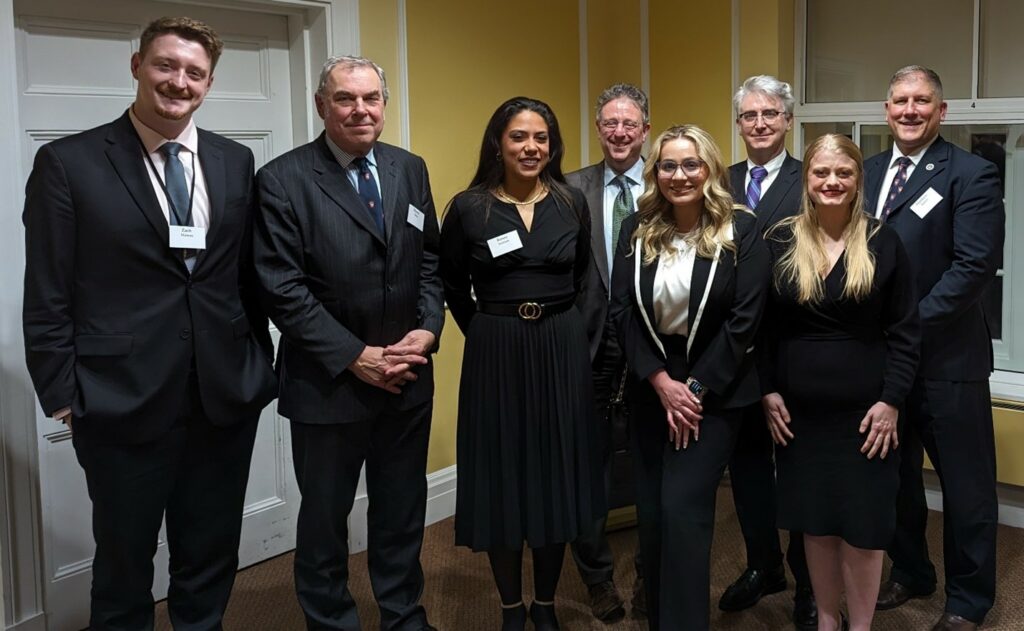
A favourite part of the weekend was making meaningful connections with other students. All the students were so welcoming and were delighted to hear about life and law school in America. In one specific exchange, we were able to share ‘Greek Life’ on American campuses, as we learned about life growing up in a small countryside village where everyone in the village owned the local store. We loved listening to the stories and getting the opportunity to build relationships with so many people.
We did get some training in the English system prior to our visit to The Honourable Society of Middle Temple. Judge Greiner and Master Nick Critelli graciously imparted on us a three-hour crash course on English law and then cheekily told us not to embarrass them or America. Although we had no idea what to expect when we stepped off the bus on that brisk Friday afternoon in Windsor, we were ready for the challenge.
When we stepped outside and took in the beautiful Windsor countryside, it was breathtaking how surreal the surroundings were. There we were, on a property that predated the inception of the nation we call home. What’s more, we were about to interact with students, barristers and Benchers who were well versed in a legal system that we knew next to nothing about. Some of us tried to further our studies by watching Rumpole of the Bailey as suggested to us by Master Critelli but provided little for the upcoming practice.
During our first session when we were told about how difficult yet rewarding the weekend was going to be, some nervousness crept in. It was hard not to think of how much harder it would be for someone who didn’t know the system mixed with those who presumedly did. In the workshops, it became more apparent. Thankfully, those that were training us were more than willing to help work through setbacks and missteps and taught us how to give proper cross and direct examinations, as well as plea mitigation. Plea mitigation was especially rewarding because we do not really have an equivalent in the American legal system.
Although the workshops and training were especially useful, we enjoyed conversations with the Masters and students during transition periods, meals and when the bar opened for the night. We were warned to prepare ourselves for political topics of interest in those times. This advice rang true during the bar hour when there were conversations aplenty about religion, the State of the Union delivered the previous evening, and the many debates on the American legal field surrounding the US Constitution, its vitality, usefulness, and recent interpretations by the Supreme Court of the United States. Despite these topics being heavy, the conversations were lively and respectful. Some of us were curious about this, since we are seeing a divisiveness in America as it seems to be going through a highly polarizing period, where people have often forgotten to see the humanity in one another.
The overall experience with the Honourable Society of Middle Temple is something we will never forget, and forever cherish. It is not wasted on us that this was a singular, impressive, and unique experience to literally walk, sleep, and take tea where recent royalty have. To make associations with like-minded people who are trying to improve the world we live in by extending justice through law to others. To see the good that comes from sharing, education, practice, and exchange is a blessing. We returned to America not only more confident and refined in our oral advocacy capabilities, but also with new perspectives, experiences and best of all, British friends and colleagues. Prior to our arrival, Judge Greiner and Master Critelli told us that their motivations for bringing US law students to this training was in the hopes of convincing more students to seek the opportunity of cross-national legal certifications. Needless to say, they succeeded. We feel indebted to all who embraced, mentored, and befriended us.
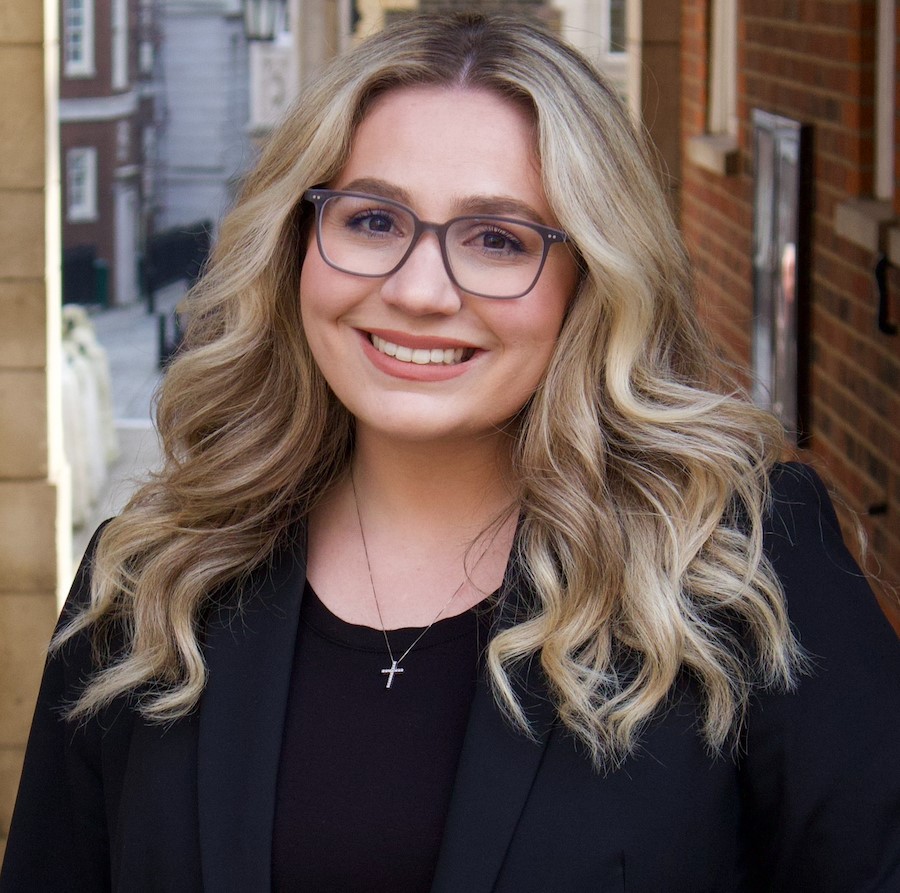
Allyse Noel grew up in California where she obtained her Bachelor of Arts degree in Philosophy at California Polytechnic State University, San Luis Obispo. She moved to Nebraska to attend Creighton University School of Law and aspires to be a Labor and Employment defense litigator when she graduates in 2025.
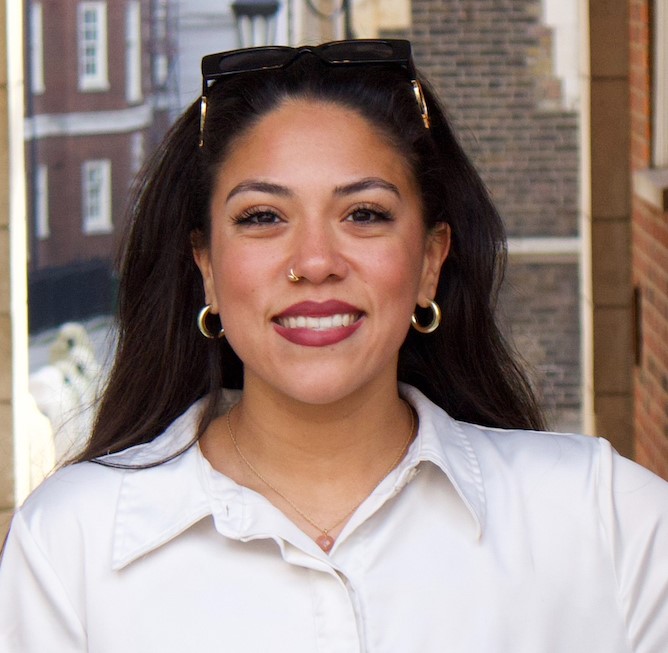
Reneé Jackson-Armendariz grew up in El Paso, Texas. She obtained a Bachelor of Arts degree in Politics and History from Regent University. She went on to receive a Master’s Degree in Public Policy, specializing in International Relations and National Security from Pepperdine University. Reneé is a rising 3L at Creighton Law and aspires to practice in the realms of National Security and International law and policy.
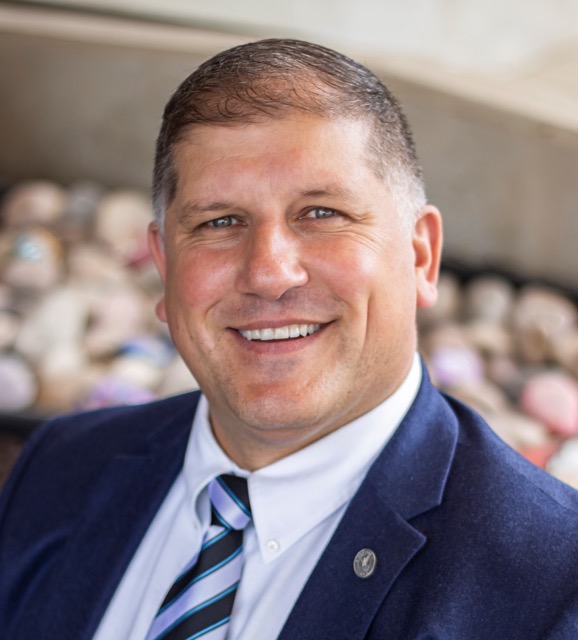
Matthew Badell hails from Dover, Delaware. He received an Associate Degree while at DLI/FLC from Monterey Peninsula College in Foreign Language, Bachelor Degree in International Relations – Asian Studies from Brigham Young University, a Master of Arts in Leadership at Bellevue University, and maintains a Senior Professional in Human Resources qualification from the HR Certification Institute. After retiring from service in the US Army as an Intelligence and Aviation officer, he is pursuing the JD/MS degree graduating in 2025 and plans to continue to serve the global community and families. He has been married to his best friend Ratry ‘Rose’ Badell for 29 years and they have three adopted children of international backgrounds.

